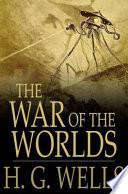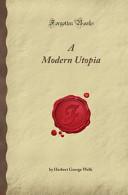Works

The Outline of History
H. G. Wells
The Island of Doctor Moreau
H. G. Wells
The Shape of Things to Come
H. G. Wells
The First Men in the Moon
H. G. Wells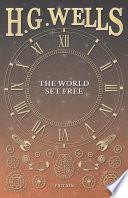
The World Set Free
H. G. WellsThe Open Conspiracy
H. G. Wells
World Brain
H. G. Wells
Anticipations
H. G. WellsThe Food of the Gods and How It Came to Earth
H. G. Wells
The War in the Air
H. G. Wells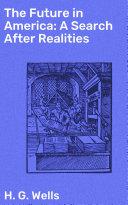
The Future in America: A Search After Realities
H. G. WellsCrux Ansata
H. G. WellsBoon
H. G. Wells
The Wife of Sir Isaac Harman
H. G. Wells
Love and Mr Lewisham
H. G. Wells
The Star
H. G. Wells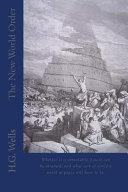
The New World Order
H. G. WellsBealby
H. G. Wells
Joan and Peter
H. G. WellsZoological Retrogression
H. G. Wells
The Soul of a Bishop
H. G. Wells
The Discovery of the Future
H. G. WellsFamous H. G. Wells Quotes
“The forceps of our minds are clumsy forceps, and crush the truth a little in taking hold of it.”
Appendix, Scepticism of the Instrument
A Modern Utopia (1905)
“Science has toiled too long forging weapons for fools to use. It is time she held her hand.”
Source: The First Men in the Moon (1901), Ch. 18: In the Sunlight
Book II, Ch. 2 (Ch. 19 in editions without Book division): What We Saw from the Ruined House
The War of the Worlds (1898)
The Food of the Gods and How It Came to Earth (1904) - Online PDF and Epub http://books.google.com/books?id=VOyeAAAAIAAJ
H. G. Wells Quotes about the world
Source: A Modern Utopia (1905), Ch. 9, sect. 5
Love and Mr Lewisham (1899), Ch. 23
Source: First and Last Things: A Confession of Faith and Rule of Life http://www.gutenberg.org/etext/4225 (1908), Ch.3, section 20, Of Abstinences and Disciplines
“One of the darkest evils of our world is surely the unteachable wildness of the Good.”
Source: A Modern Utopia (1905), Ch. 2, sect. 6
Source: The Invisible Man (1897), Chapter 22: In The Emporium
The Mind at the End of its Tether (1945), p. 1
H. G. Wells: Trending quotes
“For neither do men live nor die in vain.”
Book II, Ch. 8 (Ch. 25 in editions without Book divisions): Dead London
The War of the Worlds (1898)
Context: For so it had come about, as indeed I and many men might have foreseen had not terror and disaster blinded our minds. These germs of disease have taken toll of humanity since the beginning of things — taken toll of our prehuman ancestors since life began here. But by virtue of this natural selection of our kind we have developed resisting power; to no germs do we succumb without a struggle, and to many — those that cause putrefaction in dead matter, for instance — our living frames are altogether immune. But there are no bacteria in Mars, and directly these invaders arrived, directly they drank and fed, our microscopic allies began to work their overthrow. Already when I watched them they were irrevocably doomed, dying and rotting even as they went to and fro. It was inevitable. By the toll of a billion deaths man has bought his birthright of the earth, and it is his against all comers; it would still be his were the Martians ten times as mighty as they are. For neither do men live nor die in vain.
Preface, p. xvi
World Brain (1938)
Context: We do not want dictators, we do not want oligarchic parties or class rule, we want a widespread world intelligence conscious of itself. To work out a way to that world brain organization is therefore our primary need in this age of imperative construction.
“And how will the new republic treat the inferior races?”
Anticipations of the Reaction of Mechanical and Scientific Progress Upon Human Life and Thought http://books.google.com/books?id=OTP8dQHO57UC (1901), The Faith, Morals, and Public Policy of The New Republic, pp. 340–343
Context: Money and credit are as much human contrivances as bicycles, and as liable to expansion and modification as any other sort of prevalent but imperfect machine.
And how will the new republic treat the inferior races? How will it deal with the black? how will it deal with the yellow man? how will it tackle that alleged termite in the civilized woodwork, the Jew? Certainly not as races at all. It will aim to establish, and it will at last, though probably only after a second century has passed, establish a world state with a common language and a common rule. All over the world its roads, its standards, its laws, and its apparatus of control will run. It will, I have said, make the multiplication of those who fall behind a certain standard of social efficiency unpleasant and difficult… The Jew will probably lose much of his particularism, intermarry with Gentiles, and cease to be a physically distinct element in human affairs in a century or so. But much of his moral tradition will, I hope, never die. … And for the rest, those swarms of black, and brown, and dirty-white, and yellow people, who do not come into the new needs of efficiency?
Well, the world is a world, not a charitable institution, and I take it they will have to go. The whole tenor and meaning of the world, as I see it, is that they have to go. So far as they fail to develop sane, vigorous, and distinctive personalities for the great world of the future, it is their portion to die out and disappear.
The world has a greater purpose than happiness; our lives are to serve God's purpose, and that purpose aims not at man as an end, but works through him to greater issues.
H. G. Wells Quotes
“John Cabal: If we don’t end war, war will end us.”
Things to Come (1936)
Book I, Ch. 1: The Eve of the War
The War of the Worlds (1898)
Context: No one would have believed in the last years of the nineteenth century that this world was being watched keenly and closely by intelligences greater than man's and yet as mortal as his own; that as men busied themselves about their various concerns they were scrutinised and studied, perhaps almost as narrowly as a man with a microscope might scrutinise the transient creatures that swarm and multiply in a drop of water. With infinite complacency men went to and fro over this globe about their little affairs, serene in their assurance of their empire over matter. It is possible that the infusoria under the microscope do the same... Yet, across the gulf of space, minds that are to our minds as ours are to those of the beasts that perish, intellects vast and cool and unsympathetic, regarded this earth with envious eyes, and slowly and surely drew their plans against us.
The World Set Free (1914)
Context: Nothing could have been more obvious to the people of the early twentieth century than the rapidity with which war was becoming impossible. And as certainly they did not see it. They did not see it until the atomic bombs burst in their fumbling hands.
Source: The Island of Doctor Moreau (1896), Ch. 22: The Man Alone
Context: There is, though I do not know how there is or why there is, a sense of infinite peace and protection in the glittering hosts of heaven. There it must be, I think, in the vast and eternal laws of matter, and not in the daily cares and sins and troubles of men, that whatever is more than animal within us must find its solace and its hope.
The Open Conspiracy (1933)
Context: How far can we anticipate the habitations and ways, the usages and adventures, the mighty employments, the ever increasing knowledge and power of the days to come? No more than a child with its scribbling paper and its box of bricks can picture or model the undertakings of its adult years. Our battle is with cruelties and frustrations, stupid, heavy and hateful things from which we shall escape at last, less like victors conquering a world than like sleepers awaking from a nightmare in the dawn.... A time will come when men will sit with history before them or with some old newspaper before them and ask incredulously,"Was there ever such a world?"
“Moral indignation is jealousy with a halo.”
The Wife of Sir Isaac Harman (1914), p. 299
Context: Moral indignation is jealousy with a halo. It is the peculiar snare of the perplexed orthodox, and soon Mr. Brumley was in a state of nearly unendurable moral indignation with Sir Isaac for a hundred exaggerations of what he was and of what conceivably he might have done to his silent yet manifestly unsuitably married wife.
Book I, Ch. 1: The Eve of the War
The War of the Worlds (1898)
Context: No one would have believed in the last years of the nineteenth century that this world was being watched keenly and closely by intelligences greater than man's and yet as mortal as his own; that as men busied themselves about their various concerns they were scrutinised and studied, perhaps almost as narrowly as a man with a microscope might scrutinise the transient creatures that swarm and multiply in a drop of water. With infinite complacency men went to and fro over this globe about their little affairs, serene in their assurance of their empire over matter. It is possible that the infusoria under the microscope do the same... Yet, across the gulf of space, minds that are to our minds as ours are to those of the beasts that perish, intellects vast and cool and unsympathetic, regarded this earth with envious eyes, and slowly and surely drew their plans against us.
Source: The Outline of History (1920), Ch. 36
Context: From 1789 to late in 1791 the French Revolution was an orderly process, and from the summer of 1794 the Republic was an orderly and victorious state. The Terror was not the work of the whole country, but of the town mob which owed its existence and its savagery to the misrule, and social injustice of the ancient regime... More lives were wasted by the British generals alone on the opening day of what is known as the Somme offensive of July, 1916 than in the whole French Revolution from start to finish.
The Rights of Man, or what are we fighting for? (1940)
Context: Throughout the whole world we see variations of this same subordination of the individual to the organisation of power. Phase by phase these ill-adapted governments are becoming uncontrolled absolutisms; they are killing that free play of the individual mind which is the preservative of human efficiency and happiness. The populations under their sway, after a phase of servile discipline, are plainly doomed to relapse into disorder and violence. Everywhere war and monstrous economic exploitation break out, so that those very same increments of power and opportunity which have brought mankind within sight of an age of limitless plenty, seem likely to be lost again, it may be lost forever, in an ultimate social collapse.
“All the miseries and discontents of life are due, he taught, to selfishness.”
Source: The Outline of History (1920), Ch. 25
Context: The Buddha Is Nearer to Us You see clearly a man, simple, devout, lonely, battling for light, a vivid human personality, not a myth. Beneath a mass of miraculous fable I feel that there also was a man. He too, gave a message to mankind universal in its character. Many of our best modern ideas are in closest harmony with it. All the miseries and discontents of life are due, he taught, to selfishness. Selfishness takes three forms — one, the desire to satisfy the senses; second, the craving for immortality; and the third the desire for prosperity and worldliness. Before a man can become serene he must cease to live for his senses or himself. Then he merges into a greater being. Buddha in a different language called men to self-forgetfulness five hundred years before Christ. In some ways he was near to us and our needs. Buddha was more lucid upon our individual importance in service than Christ, and less ambiguous upon the question of personal immortality.
Book II, Ch. 8 (Ch. 25 in editions without Book divisions): Dead London
The War of the Worlds (1898)
Context: For so it had come about, as indeed I and many men might have foreseen had not terror and disaster blinded our minds. These germs of disease have taken toll of humanity since the beginning of things — taken toll of our prehuman ancestors since life began here. But by virtue of this natural selection of our kind we have developed resisting power; to no germs do we succumb without a struggle, and to many — those that cause putrefaction in dead matter, for instance — our living frames are altogether immune. But there are no bacteria in Mars, and directly these invaders arrived, directly they drank and fed, our microscopic allies began to work their overthrow. Already when I watched them they were irrevocably doomed, dying and rotting even as they went to and fro. It was inevitable. By the toll of a billion deaths man has bought his birthright of the earth, and it is his against all comers; it would still be his were the Martians ten times as mighty as they are. For neither do men live nor die in vain.
Anticipations of the Reaction of Mechanical and Scientific Progress Upon Human Life and Thought http://books.google.com/books?id=OTP8dQHO57UC (1901), The Faith, Morals, and Public Policy of The New Republic, pp. 340–343
Context: Money and credit are as much human contrivances as bicycles, and as liable to expansion and modification as any other sort of prevalent but imperfect machine.
And how will the new republic treat the inferior races? How will it deal with the black? how will it deal with the yellow man? how will it tackle that alleged termite in the civilized woodwork, the Jew? Certainly not as races at all. It will aim to establish, and it will at last, though probably only after a second century has passed, establish a world state with a common language and a common rule. All over the world its roads, its standards, its laws, and its apparatus of control will run. It will, I have said, make the multiplication of those who fall behind a certain standard of social efficiency unpleasant and difficult… The Jew will probably lose much of his particularism, intermarry with Gentiles, and cease to be a physically distinct element in human affairs in a century or so. But much of his moral tradition will, I hope, never die. … And for the rest, those swarms of black, and brown, and dirty-white, and yellow people, who do not come into the new needs of efficiency?
Well, the world is a world, not a charitable institution, and I take it they will have to go. The whole tenor and meaning of the world, as I see it, is that they have to go. So far as they fail to develop sane, vigorous, and distinctive personalities for the great world of the future, it is their portion to die out and disappear.
The world has a greater purpose than happiness; our lives are to serve God's purpose, and that purpose aims not at man as an end, but works through him to greater issues.
“The study of Nature makes a man at last as remorseless as Nature.”
Source: The Island of Doctor Moreau (1896), Ch. 14: Doctor Moreau Explains
Context: To this day I have never troubled about the ethics of the matter. The study of Nature makes a man at last as remorseless as Nature.
“The atomic bomb had dwarfed the international issues to complete insignificance.”
The World Set Free (1913)
Context: The atomic bomb had dwarfed the international issues to complete insignificance. When our minds wandered from the preoccupations of our immediate needs, we speculated upon the possibility of stopping the use of these frightful explosives before the world was utterly destroyed. For to us it seemed quite plain that these bombs and the still greater power of destruction of which they were the precursors might quite easily shatter every relationship and institution of mankind... war must end and that the only way to end war was to have but one government for mankind.
“Human history becomes more and more a race between education and catastrophe…”
Source: The Outline of History (1920), Ch. 41
Context: Human history becomes more and more a race between education and catastrophe... Yet, clumsily or smoothly, the world, it seems, progresses and will progress.
Source: The Outline of History (1920), chapter no. 25.4 (Buddhism and Ashoka) page no 365-366
Context: Ashoka (264 to 227 B. C.), one of the great monarchs of history, whose dominions extended from Afghanistan to Madras... is the only military monarch on record who abandoned warfare] after [[victory. He had invaded Kalinga (255 B. C.), a country along the east coast of Madras, perhaps with some intention of completing the conquest of the tip of the Indian peninsula. The expedition was successful, but he was disgusted by what be saw of the cruelties and horrors of war. He declared, in certain inscriptions that still exist, that he would no longer seek conquest by war, but by religion, and the rest of his life was devoted to the spreading of Buddhism throughout the world. He seems to have ruled his vast empire in peace and with great ability. He was no mere religious fanatic. For eight and twenty years Asoka worked sanely for the real needs of men. Amidst the tens of thousands of names of monarchs that crowd the columns of history, their majesties and graciousnesses and serenities and royal highnesses and the like, the name of Asoka shines, and shines, almost alone, a star. From the Volga to Japan his name is still honoured. China, Tibet, and even India, though it has left his doctrine, preserve the tradition of his greatness. More living men cherish his memory to-day than have ever heard the names of Constantine or Charlemagne.
The Food of the Gods and How It Came to Earth (1904)
Context: They may fight against greatness in us who are the children of men, but can they conquer? Even if they should destroy us every one, what then? Would it save them? No! For greatness is abroad, not only in us, not only in the Food, but in the purpose of all things! It is in the nature of all things, it is part of space and time. To grow and still to grow, from first to last that is Being, that is the law of life. What other law can there be?
Source: The Outline of History (1920), chapter no. 25.4 (Buddhism and Ashoka) page no 365-366
Context: Ashoka (264 to 227 B. C.), one of the great monarchs of history, whose dominions extended from Afghanistan to Madras... is the only military monarch on record who abandoned warfare] after [[victory. He had invaded Kalinga (255 B. C.), a country along the east coast of Madras, perhaps with some intention of completing the conquest of the tip of the Indian peninsula. The expedition was successful, but he was disgusted by what be saw of the cruelties and horrors of war. He declared, in certain inscriptions that still exist, that he would no longer seek conquest by war, but by religion, and the rest of his life was devoted to the spreading of Buddhism throughout the world. He seems to have ruled his vast empire in peace and with great ability. He was no mere religious fanatic. For eight and twenty years Asoka worked sanely for the real needs of men. Amidst the tens of thousands of names of monarchs that crowd the columns of history, their majesties and graciousnesses and serenities and royal highnesses and the like, the name of Asoka shines, and shines, almost alone, a star. From the Volga to Japan his name is still honoured. China, Tibet, and even India, though it has left his doctrine, preserve the tradition of his greatness. More living men cherish his memory to-day than have ever heard the names of Constantine or Charlemagne.
Preface, p. xiii
World Brain (1938)
Context: There has been … an enormous waste of human mental and physical resources in premature revolutionary thrusts, ill-planned, dogmatic, essentially unscientific reconstructions and restorations of the social order, during the past hundred years. This was the inevitable first result of the discrediting of those old and superseded mental adaptations which were embodied in the institutions and education of the past. They discredited themselves and left the world full of problems.
“Are we such apostles of mercy as to complain if the Martians warred in the same spirit?”
Book I, Ch. 1: The Eve of the War
The War of the Worlds (1898)
Context: And before we judge of them too harshly we must remember what ruthless and utter destruction our own species has wrought, not only upon animals, such as the vanished bison and the dodo, but upon its inferior races. The Tasmanians, in spite of their human likeness, were entirely swept out of existence in a war of extermination waged by European immigrants, in the space of fifty years. Are we such apostles of mercy as to complain if the Martians warred in the same spirit?
Source: A Modern Utopia (1905), Ch. 5, sect. 2
Source: The Invisible Man (1897), Chapter 7: The Unveiling of the Stranger
“Heresies are experiments in man's unsatisfied search for truth.”
Crux Ansata: An Indictment of the Roman Catholic Church (1943)
Book I, Ch. 10: In the Storm
The War of the Worlds (1898)
Book II, Ch. 10 (Ch. 27 in editions without Book divisions): The Epilogue
The War of the Worlds (1898)
On the British government's decision to build the Singapore Naval Base, in an article for the Westminster Gazette (13 October 1923)
Source: A Modern Utopia (1905), Ch. 5, sect. 2
The Salvaging of Civilization (1921)
Quoted in Charlie Chaplin, My Autobiography (1964)
Source: The Invisible Man (1897), Chapter 25: The Hunting of the Invisible Man
Kipps the Story of a Simple Soul (1905) Bk. 2, ch. 5
Source: The First Men in the Moon (1901), Ch. 24: The Natural History of the Selenites
“Man is an imperfect animal and never quite trustworthy in the dark.”
The Open Conspiracy (1928)
Source: The Invisible Man (1897), Chapter 23: In Drury Lane
Things to Come (1936)
Source: The Outline of History (1920), Ch. 28
Source: First and Last Things: A Confession of Faith and Rule of Life http://www.gutenberg.org/etext/4225 (1908), Ch. 4, sect. 6, The Last Confession
Source: The Invisible Man (1897), Chapter 19: Certain First Principles
Source: The Invisible Man (1897), Chapter 7: The Unveiling of the Stranger
Source: A Modern Utopia (1905), Ch. 3, sect. 4
“Night, the mother of fear and mystery, was coming upon me.”
Book II, Ch. 8 (Ch. 25 in editions without Book divisions): Dead London
The War of the Worlds (1898)
Book I, Ch. 5: The Heat-Ray
The War of the Worlds (1898)
The Soul of a Bishop (1917)
“He was inordinately proud of England, and he abused her incessantly.”
Mr. Britling Sees It Through, Bk. 1, ch. 2, sect. 2 (1916)

